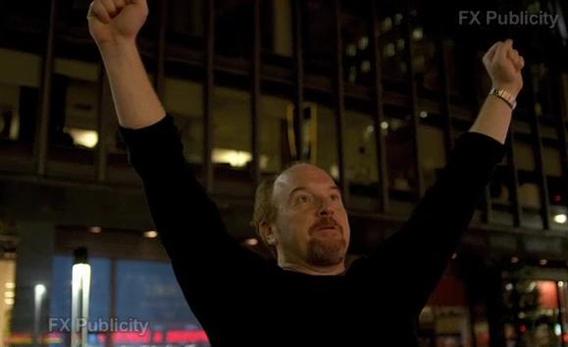You’re right, Jonah: a Late Show With Louis C.K. would probably consist of meta-jokes and jerk-off confessions, among other things. And it would, apparently, be pretty good! I would tune in, anyway. The believable charm of that test episode was one of the more impressive things about last night’s Louie.
The most impressive? Probably that ending. We all knew that Louie wouldn’t end up getting the Late Show gig—though we never considered one possibility: that he could have gotten the job, and then C.K. could have just ignored that plot point for the rest of the series, continuity (as almost always) be damned. Or C.K. could’ve intermittently dipped from here on out into an alternate universe wherein Louie hosts a late-night show. Heck, he could still do that. It would be an appropriate tribute to David Lynch, with shades of Mullholland Dr.
But for now I’m happy with the way this arc played out—and especially that last-minute shift from dejection to triumph. The episode’s early moments harkened back to last week’s theme of being yourself and the showbiz pressure to be someone else. The final lesson, though—and I agree that there was one, Jonah—was not the Polonius pabulum of “To thine own self be true,” but something along the lines of, “Push yourself to be something more.” Sure, that sounds like a Nike slogan, but it’s not terrible advice. And C.K.’s current success really is a tribute to an incredible work ethic, so why not portray that? I’m a childless child of Seinfeld, too, Jonah, but that show, for all its greatness, was somewhat limited by its refusal to consider life lessons at all. C.K. is working with a wider palette.
And I loved the boxing sequence at the end, which seemed to function differently than most of the show’s epilogues. I took it to be an additional scene, one that happened after Letterman signed his new contract. Louie is still fighting, getting in shape, wanting more. He’s no longer circling failure in a rapidly decaying orbit.
I didn’t mind the sentimental scenes with the daughters, either. Yes, the music was a bit much; that was also the case when Seinfeld told Doug and Louie to keep it a secret that he got the job, and they both realized, per Jack Dall’s words of wisdom, that he must be lying.* A look between the two would have sufficed; instead we got somber music and the two men repeating Dall’s words. (Granted, C.K. declined to show Louie later realizing that of course Tardigan was playing him all along: He told Louie to keep Letterman’s retirement a secret, so Louie should have known it was bogus.)
But heartwarming moments between parents and children happen pretty often, if my Facebook feed is any indication—so refusing to depict such scenes would arbitrarily limit the material out there in the world that C.K. has to work with. And, to be honest, I found that moment with the daughters genuinely touching.
That’s not to say the episode was perfect. There were two more training montages than were absolutely necessary, for instance, and the narrative beats at the end felt a little rushed. I still think the Parker Posey-starring two-parter is the season’s highlight. But I will gladly watch this three-episode sequence again—for me, the ultimate test of a TV show.
Two other notes before I ask Allison whether we’re both being too kind. This series has gone to some dark places—lonely funerals followed by seedy strip joints, sad sexual encounters that end with women crying, borderline sexual assault. But nothing we’ve seen has been quite as grim as Louie trying to make Jack Dall laugh on command. That was gruesome. Dall’s response, on the other hand—“You just bought yourself another week”—was hilarious. As was the tag: Dall telling Doug, previously unseen, to leave.
Finally, there’s a little bit of possibly-relevant backstory that gives the conclusion some added poignancy. C.K. wrote for Letterman back in the mid-’90s—around the time, if I have my chronology right, that he did one of his earliest network stand-up spots, on Letterman’s show. He only had that job a few months before going to write for the doomed Dana Carvey Show. And then he went 15 years without appearing on Late Show,* even though, as he put it, “Dave’s who I watch.” As of last year, at least, he couldn’t explain the apparent ban—but he was told, apparently, that “I’m not OK there anymore.” He did finally go on Letterman again late last year, but he looked distinctly uncomfortable, and his set was only so-so. Having all this in mind gave that “fuck you” at the end a little more oomph.
1, 2, 3, funny—
David
* Why do they all say “Late Show,” by the way, rather than “the Late Show”? At first I thought this was one of Dall’s many quirks, but then Seinfeld said it that way, too. Is it like how CIA agents never say “the CIA,” but instead drop the article?
Correction, Sept. 21, 2012: This entry misspelled the last name of David Lynch’s character. (Return.)
